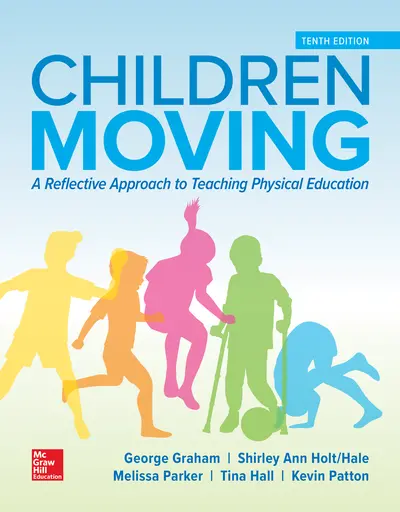My Account Details

ISBN10: 0078022746 | ISBN13: 9780078022746

* The estimated amount of time this product will be on the market is based on a number of factors, including faculty input to instructional design and the prior revision cycle and updates to academic research-which typically results in a revision cycle ranging from every two to four years for this product. Pricing subject to change at any time.
Instructor Information
Quick Actions (Only for Validated Instructor Accounts):
Children Moving, introduces a process of teaching that provides a background for adapting, adjusting, and modifying lessons so they are interesting and worthwhile for all children - from the lowest to the highest skill and fitness levels. The ultimate goal is to guide youngsters in the process of becoming physically active for a lifetime. Rather than simply describing games and activities, Children Moving emphasizes the importance of children learning to move by focusing on developmentally appropriate skill themes that are used in virtually all sports and physical activities. The intended result is children becoming skillful movers and eager participants in physical activity.
CHAPTER 1: The Value and Purpose of Physical Education for Children
CHAPTER 2: The Skill Theme Approach
CHAPTER 3: Skill Themes, Movement Concepts, and the National Standards
CHAPTER 4: Reflective Teaching
CHAPTER 5: Determining Generic Levels of Skill Proficiency
CHAPTER 6: Planning and Developing the Content
CHAPTER 7: Establishing an Environment for Learning
CHAPTER 8: Maintaining Appropriate Behavior
CHAPTER 9: Instructional Approaches
CHAPTER 10: Adapting the Content for Diverse Learners
CHAPTER 11: Observing Student Responses
CHAPTER 12: Assessing Student Learning
CHAPTER 13: Analyzing Reflective Teaching
CHAPTER 14: Space Awareness
CHAPTER 15: Effort
CHAPTER 16: Relationships
CHAPTER 17: Traveling
CHAPTER 18: Chasing, Fleeing, and Dodging
CHAPTER 19: Bending, Stretching, Curling, and Twisting
CHAPTER 20: Jumping and Landing
CHAPTER 21: Balancing
CHAPTER 22: Transferring Weight and Rolling
CHAPTER 23: Kicking and Punting
CHAPTER 24: Throwing and Catching
CHAPTER 25: Volleying and Dribbling
CHAPTER 26: Striking with Rackets and Paddles
CHAPTER 27: Striking with Long-Handled Implements
CHAPTER 28: Teaching Physical Fitness, Physical Activity, and Wellness
CHAPTER 29: Teaching Educational Dance
CHAPTER 30: Teaching Educational Gymnastics
CHAPTER 31: Teaching Educational Games
CHAPTER 32: Integrating the Skill Theme Approach Across the Curriculum
CHAPTER 33: Building Support for Your Program
CHAPTER 34: Physical Education for Tomorrow’s Children
Accessibility
Creating accessible products is a priority for McGraw Hill. We make accessibility and adhering to WCAG AA guidelines a part of our day-to-day development efforts and product roadmaps.
For more information, visit our accessibility page, or contact us at accessibility@mheducation.com
Affordability
Reduce course material costs for your students while still providing full access to everything they need to be successful. It isn't too good to be true - it's Inclusive Access.
Need support? We're here to help - Get real-world support and resources every step of the way.